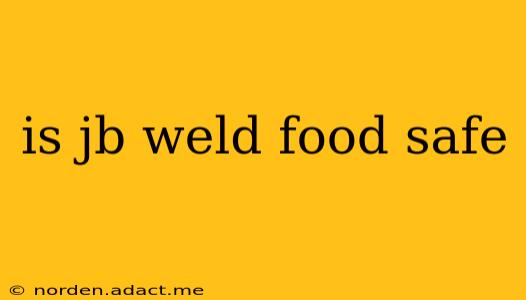JB Weld is a popular epoxy adhesive known for its incredible strength and versatility. But when it comes to food, safety is paramount. So, the short answer is: no, JB Weld is not food safe. However, understanding why this is the case, and the implications of this, requires a deeper dive.
What is JB Weld Made Of?
JB Weld's exact formulation is a trade secret, but it's generally known to contain a blend of epoxy resins, hardeners, and fillers. These components are not designed for contact with food and can pose several potential health risks if ingested or repeatedly exposed to food products.
Why JB Weld Isn't Suitable for Food Contact
Several reasons contribute to JB Weld's unsuitability for food-related applications:
- Toxicity: The epoxy resins and hardeners in JB Weld are not considered non-toxic. While a small amount might not cause immediate harm, prolonged or repeated exposure could lead to health problems.
- Chemical Leaching: Over time, even cured JB Weld might leach small amounts of chemicals into food, especially if exposed to heat, acidic substances, or prolonged contact. This leaching could contaminate food products.
- Porosity: While JB Weld is durable, it's not completely impermeable. Microscopic pores could trap food particles and bacteria, leading to contamination and potential spoilage. Cleaning such a surface thoroughly is also extremely difficult.
What About Cured JB Weld? Is it Safe After it Hardens?
Even after curing, JB Weld remains unsuitable for food contact. The curing process doesn't eliminate the inherent toxicity or the potential for chemical leaching. The hard, seemingly inert surface is still composed of materials not intended for food use.
What to Use Instead of JB Weld for Food-Safe Repairs?
There are several food-safe alternatives depending on the repair needed:
- Food-grade silicone: This is ideal for sealing or caulking in areas that might come into contact with food.
- Epoxy designed for food contact: Some specialty epoxies are specifically formulated for food-safe applications. Ensure that it is clearly labeled as such before using it.
- Plastic welding: For repairs on plastic containers, plastic welding can provide a strong, food-safe seal.
- Metal solder or brazing: For metal repairs, depending on the material, these methods offer robust, food-safe solutions.
Can I Use JB Weld on a Surface That Might Come into Contact with Food?
Absolutely not. Avoid using JB Weld on any surface where even indirect contact with food is possible. The risk of contamination, however small, isn't worth it. Always opt for a food-grade adhesive or repair method.
What Happens if JB Weld Comes into Contact with Food?
If JB Weld accidentally comes into contact with food, discard the affected food immediately. Thoroughly clean the affected area with soap and water, ensuring all traces of the adhesive are removed.
In conclusion, while JB Weld is an extremely powerful adhesive, its use should be strictly limited to non-food applications. Prioritizing food safety is crucial; always use food-safe alternatives for any repairs involving food contact. Remember, your health is worth the extra effort.
